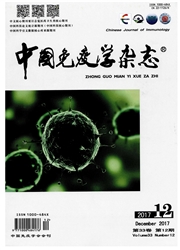

 中文摘要:
中文摘要:
目的:通过体内动物实验研究CD59-siRNA对卵巢癌细胞CD59的沉默效应及抑瘤作用,探讨CD59在肿瘤免疫逃逸中的作用。方法:将转染CD59干扰质粒的A2780细胞(T组)、转染空质粒的A2780细胞(V组)及未转染的A2780细胞(C组)分别接种于裸鼠皮下,通过绘制肿瘤生长曲线,裸鼠移植瘤组织切片CD59 mRNA原位杂交及CD59蛋白的免疫组化研究其抑瘤效应及对CD59的沉默效应。结果:肿瘤生长曲线显示,与对照组相比,CD59干扰质粒转染组肿瘤生长明显受抑制(P〈0.05)。原位杂交及免疫组化结果表明,干扰组的CD59 mRNA及CD59蛋白与对照组相比显著降低(P〈0.05)。结论:裸鼠体内实验表明,特异性沉默CD59基因的siRNA表达载体可以明显抑制CD59的表达,增加了卵巢癌细胞对补体攻击的敏感性,从而抑制卵巢癌在体内的生长,进一步说明了CD59在肿瘤免疫逃逸中的作用。
 英文摘要:
英文摘要:
Objective: To investigate the inhibitiory effect of CD59-siRNA on CD59 gene expression and the growth of xenografted ovarian cancer in vivo,and to explore the role of CD59 in tumor immune escape.Methods: A2780 cells transfected with siRNA plasmid (T group), A2780 cells transfected with blank plasmid (V group) and the wild ,a2780 cells (C group) were subcutaneously injected into nude mice,respectively. The inhihitiory effect of CD59-siRNA on tumor growth and CD59 expression was evaluated by tumor growth curves and in situ hybridization (ISH) and immunohistochemistry (IHC). Results:The tumor growth curves demonstrated that the growth of cells transfected with siRNA plasmid was significantly inhibited ( P 〈 0.05). ISH and IHC showed that the expression of CD59 mRNA and CD59 protein were decreased significantly compared with other groups ( P 〈 0.05). Conclusion: Studies of in vivo experiment demonstrate that CD59-siRNA significantly inhibites the expression of CD59, increases the sensitivity of A2780 cells to the complement attack and inhibites the tumor growth. The resuits may further indicate the role of CD59 in tumor immune escape.
 同期刊论文项目
同期刊论文项目
 同项目期刊论文
同项目期刊论文
 期刊信息
期刊信息
